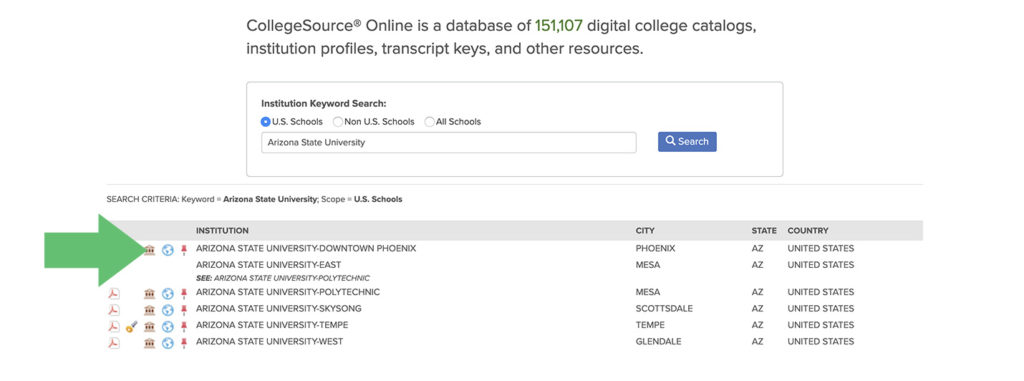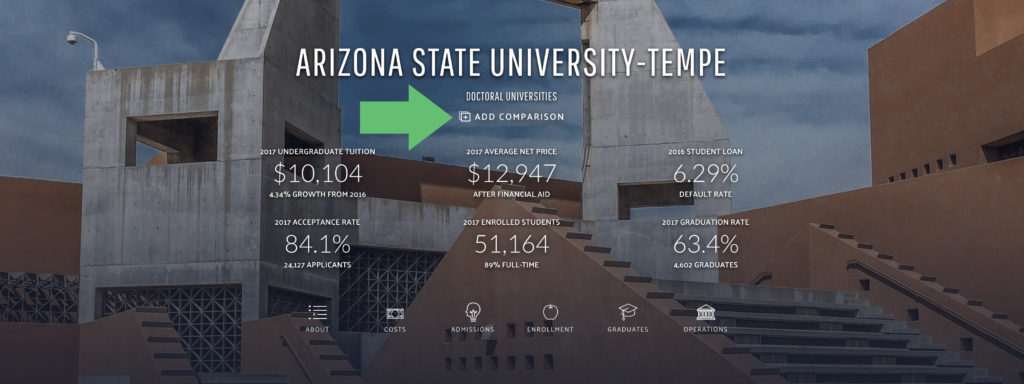Disclaimer: The information on our website is provided for general information purposes only. We make no representations or warranties of any kind, express or implied, about the completeness, accuracy, reliability, suitability or availability with respect to the website or the information contained on our website for any purpose. Any reliance on such information is therefore strictly at your own risk and we are not liable for any damages or losses arising out of or resulting from your reliance on any information contained on our website.
There are many tools that can help you research colleges and this article walks you step-by-step through how to research colleges. We’ll show you where you can find the college’s graduation rate, the average cost it takes a student to complete their degree at each college, and how to find a college’s accreditation status.
Steps to Research Colleges
The following steps walk you through how to research colleges quickly. You’ll even get access to a free College Research Tracker in Step 1 to get you going!
Step 1: Get Organized to Research Colleges
When you research colleges, you want to organize the colleges you have researched so you compare colleges against one another. This will help you organize the pros and cons of each college. We created a College Research Tracker in a Google Spreadsheet for you to use. Simply click the Copy button and you’ll be all set. You will need a free Google Documents account if you don’t already. Tracking your college research online with Google Documents gives you access to your college research spreadsheet from any computer and or smartphone. You can also share the document with others. Use the spreadsheet columns to track what statistics are most important to you.
Step 2: Research Cost and Graduation Rates
One particularly useful website to use when researching colleges is Data USA. Type the name of the college you are researching into the Search field and gain instant access to useful data about that college. You’ll want to look at the following sections: Tuition Cost, Graduation Rate, and other Student Expenses. There’s a ton of other valuable data about the college listed that you may want to track as well.

Step 3: Research the Colleges Accreditation Status
You also want to make sure the colleges you are interested in are accredited. If a college you attend is not accredited, the classes you take at that college most likely will not transfer to an accredited college. This means attaining a Master’s degree or transferring to another college would be difficult or more expensive since you may have to retake courses. You’ll also need to make sure the program at the college is accredited. In order to take licensure exams, your college program must be accredited to even sit for the exams. This is especially true of medical professions. To check a college’s accreditation, visit CollegeSource.org and type in the name of the college you are researching and click Search. Then, click the Institutional Profile icon (this looks like a building).

Next, review the Accreditation section on this page. You want to ensure it’s regionally accredited and accredited for the degree program you are interested in, especially for medical careers.
Step 4: Compare your Colleges
You can use the Google Spreadsheet you’ve been using to glance at the colleges you are researching and compare them to one another. However, you can also use DATA USA to compare colleges as well.

Step 5: Narrow down your College List
At this point, you probably have a few colleges that stand out above the rest. Next, it’s time to research if the college has the amenities and location you’re looking for. For instance, you may want a college that offers student housing, or a school that participates in Division 1 sports, or maybe you want to live in a city or in a small town. These additional details will help you narrow down your list to choose a college that fits what you’re looking for.
In conclusion, researching colleges is essential for informed decision-making. This article provides a comprehensive guide, emphasizing organization, cost analysis, accreditation status, comparison tools, and narrowing down preferences. By following these steps, you’ll make a well-informed college choice.

